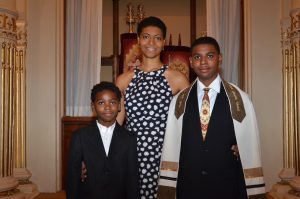Jennifer Esteen is a nurse, mother, community activist and in the running to become California’s first Black-Jewish Gay Assemblymember. I sat down with Esteen to discuss how her many identities shape her activism and what she hopes her legacy will be. Below are excerpts from our conversation.
You’ve been part of the Be’chol Lason community for some time, how did your family become connected to our community?
Be’chol Lashon is pretty sweet. I found it looking for something for my boys to do over the summer. The Jewish Federation had the scholarship to get Jewish kids to camp. I remember how fun Jewish camp was for me and I wanted my kids to have an opportunity to experience that. I was really excited to find a camp that focused on kids who were not just Jewish but were also Jews of Color. I remember getting there and saying “look at all these little brown babies.” It was special to not be the only one or to be asked to legitimize our identities. I still have parent friends from Be’chol Lashon that are part of my community.
Why is it important to you to have Jewish Voices of Color represented in politics?
It’s a unique voice. Mixed identity to me is a hallmark identity of America. America is a place where many cultures intersect. Even from the inception of this nation, despite our colonial history and laws against intermarriage, people did what people do, they shared culture, they fell in love and they had kids.
But in 2021 people are being forced to choose between identities. When I was growing up, people were still calling America a melting pot, even though mixed wasn’t even an option for identity yet.
 I’ve always Identified as a Black Jew and because of that people have asked me how I became a Jew. A Jewish person who presents as white is not typically asked to legitimize their existence or their identity as a Jew. Representing Jews of Color as a local leader is important because it gives visibility and legitimacy to other Jews of Color. My face isn’t necessarily the one people think of when they think of Jewish leadership. In the Jewish community especially, there is so much diversity. Jews live all over the world and identify differently based on their family and geographical lineage. All these experiences should be considered Jewish without regard for skin tones.
I’ve always Identified as a Black Jew and because of that people have asked me how I became a Jew. A Jewish person who presents as white is not typically asked to legitimize their existence or their identity as a Jew. Representing Jews of Color as a local leader is important because it gives visibility and legitimacy to other Jews of Color. My face isn’t necessarily the one people think of when they think of Jewish leadership. In the Jewish community especially, there is so much diversity. Jews live all over the world and identify differently based on their family and geographical lineage. All these experiences should be considered Jewish without regard for skin tones.
How do your identities inform your decision to run for elected office?
My identity is my breath. My identity as a Registered Nurse (RN) is important because it informs my decisions and actions; we are still in a public health crisis and I can only experience it as a nurse and from a nurse’s lens. My identity as a single mother is important for connecting with families and other parents. My identity as a person who has experienced bankruptcy and the loss of my home is important for connection and deep understanding of community members struggling with the same circumstances that have been exacerbated by the current public health crisis. My identity as a Gay Black Jewish woman and the intersectionality of all these identities gives me a unique perspective, informs all my decisions, and will guide the way I serve my Assembly district, which is 80% BIPOC. (per 2018 Census data)
What do you want your legacy to be?
I want my legacy to be a statewide expansion of mental health and the adoption of universal health care in California. The stigma associated with mental health is unfortunate. Based on averages, we all know someone, a friend or loved one, or perhaps, that has needed to see a therapist over the last year.
The access folks have to mental health care, however, is different based on a person’s ability to pay and access to insurance coverage. For some, access to care is limited to dialing 911 after months of not seeking or inability to cover the cost of care. The County’s proposed solution is to allocate millions of dollars to the jail so care can be provided there.
Alameda County is home to the most 5150’s, 72-hour involuntary psychiatric holds, (danger to self, danger to others, or grave disability) per capita, in the state of California. Police contact is the main way people get placed on these psychiatric holds. In Alameda County, this means that people are being treated in a locked unit at John George Psychiatric Pavilion (JGP) while they are in crisis. Keeping people in jail or in a locked psychiatric unit is not a humane patient-centered solution.
The California Department of Justice issued a report in 2020 that stated John George Psychiatric Hospital and the county jail were not adequately meeting the Americans with Disabilities Act mandated psychiatric treatment standards for clients that were being held. They also stated that in the jail, people were being held unconstitutionally specifically because there are inadequate community-based psychiatric resources. According to the Department of Justice, this is a violation of people’s constitutional rights.
I believe we can do better and in order to do so, we need state-level leadership and changes to our current system. Whether or not I win this campaign, my goal is to spread awareness about the inadequate outpatient behavioral health resources in our current medical system.







